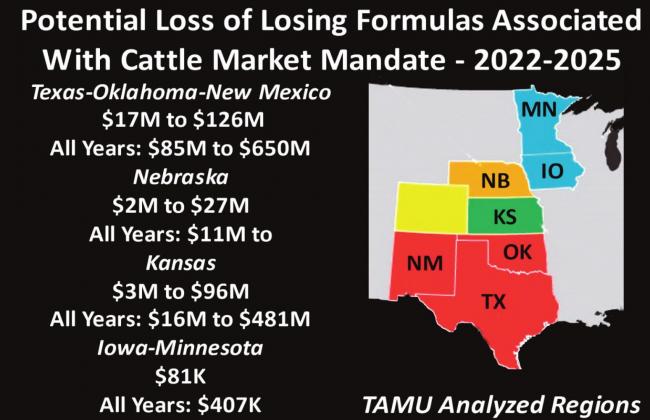Texas Farm Bureau (TFB) and American Farm Bureau Federation(AFBF) has raised concerns that possible legislation (Senate Bill 3229) federally mandating cash trade for cattle will be inserted into the Cattle Price Discovery and Transparency Act, decreasing the price of cattle in Texas from $17 million to $126 million annually.
According to TFB, alternative marketing arrangements between feedlots and packers have added at least $50 to the value of live cattle. But a government mandate that forces buyers and sellers to trade in a less efficient, higher risk manner will ultimately cost the cattle industry millions.
Additionally, both the TFB and AFBF oppose the legislation because it takes away ranchers’ freedom to market cattle as they see fit. No studies or supporting evidence have proven a government mandate in the cattle market will increase the price of cattle. Economists at top universities have provided extensive analysis proving the mandate would have a negative effect on cattle markets with a decrease in the price per head of cattle. It is critical to oppose this legislation.
AFBF policy specifically states in Section 310/Livestock Marketing: 4.2 that: “We oppose government mandates that force any livestock slaughter facility to purchase a set percentage of their live animal supply via cash bids.”
The AFBF board of directors voted on the following policy position regarding the Cattle Price Discovery and Transparency Act:
“The American Farm Bureau Federation (AFBF) will continue to stay engaged in the Cattle Price Discovery and Transparency Act, but with strong opposition to the provision on mandatory minimum negotiated trade.”
While TFB is committed to working toward solutions to increase transparency and price discovery for cattle ranchers, it states it is important to ensure legislation is well thought out before being enacted. Failure to do so can hurt the very producers it is intended to help.
Numerous reports on U.S. cattle marketing, including information on supply chain disruptions, do not point to mandating cash trade as a successful solution.
According to the Agricultural and Food Policy Center, mandated cash trade would cost ranchers between $23 million to $249 million annually depending on where the secretary of agriculture sets the mandate during the five years, with about 90% of the total costs shared by Texas, Kansas, Oklahoma and New Mexico cattle producers.
The Cattle Markets Working Group consisted of 10 state Farm Bureau presidents—Arizona, Iowa, Kansas, Kentucky, Mississippi, Montana, Nebraska, New York and Texas, as well as AFBF vice president from South Dakota.
“Additional regulation may not solve the problems as intended and could potentially result in negative consequences. A key point to remember when discussing the optimal level of negotiated transactions is that price discovery is not the same as price determination.
“While enhanced price discovery is a good thing, it does not necessarily mean it will result in higher prices (as many proponents of minimum thresholds contend). Mandatory minimum negotiated trade could potentially inhibit a producer’s ability to enter into AMAs, which are typically a premium paid above market value.”
Seven extension, agribusiness and livestock marketing experts said, “There is no research evidence of any significant or persistent fed cattle price discovery problem at this time. This legislation is attempting to solve a problem that does not exist. As such, this legislation offers zero benefits for fed cattle markets and imposes many millions of dollars of additional cost, added risk, and lost value. The exact cost will depend on details of implementation, but the cost is minimally hundreds of millions of dollars resulting in lower feeder cattle prices and higher consumer beef prices.”
Published by economists at the Agricultural and Food Policy Center, “Negotiated trade mandates do provide additional price discovery and market transparency. More price discovery, however, does not mean that cattle prices would be higher. It’s worth explicitly pointing out the economic tradeoffs that this portion of Senate Bill 3229 creates. The bill does increase price discovery, but at the cost of lower prices to cattle producers and higher prices to beef consumers. There is no evidence that increasing price discovery would increase cattle prices.”
The Agricultural and Food Policy Center in a report stated, “Thus, a potential outcome is that policies aimed at increasing negotiated cash trades and thereby reducing AMAs may have the unintended consequence of reducing overall economic surpluses currently achieved in the fed cattle and beef sector.”
The Cattle Price Discovery and Transparency Act has been referred to the U.S. Senate and U.S. House Agriculture Committees. The Senate Ag Committee held a hearing on the legislation on April 22 but has yet to mark-up the bill and vote it out of committee.
According to TFB, further action on the legislation is imminent, and is encouraging cattle producers to contact their congressmen to oppose the bill if the mandate portion is included.
Texas Farm Bureau has launched a website for concerned producers to view the analyses and information at texasfarmbureau.org/cattlemarkets.

